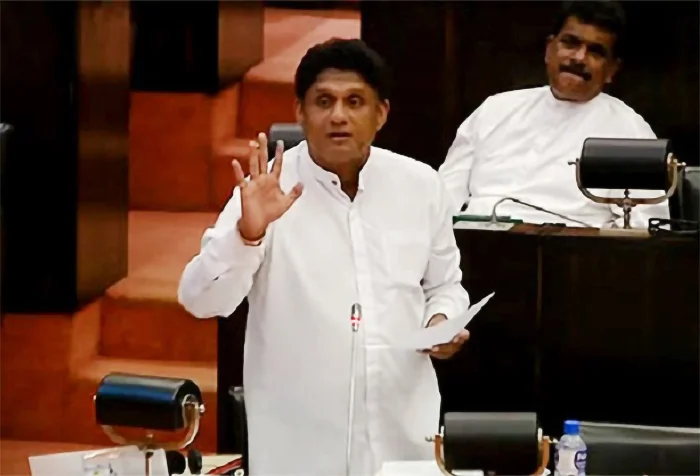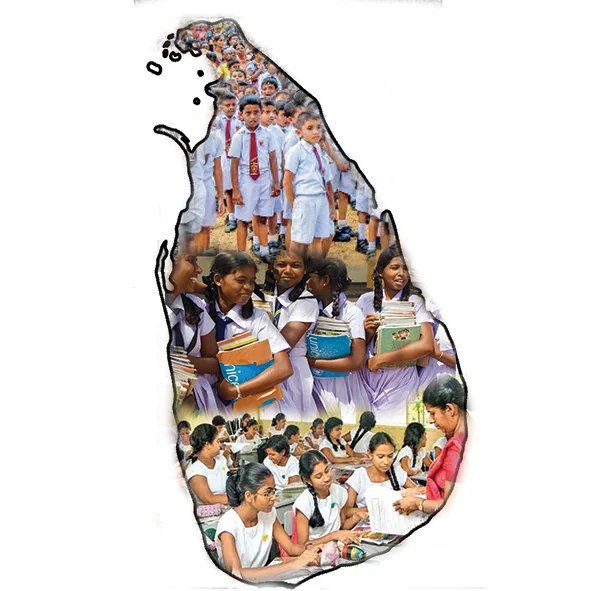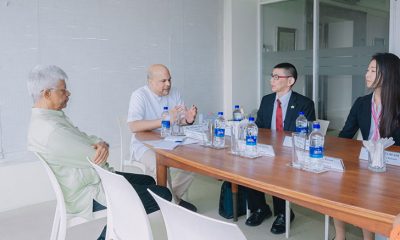Opinion
Humane capitalism needed to generate national wealth

(Text of Opposition Leader Sajith Premadasa’s speech in Parliament during the ongoing debate on Budget 2025)
When analysing the solutions that the 2025 Budget should provide for the country, it is crucial to examine the mandate given to implement such a budget and how that mandate has been executed.
The policy framework presented to secure the mandate was “A Thriving Nation – A Beautiful Life” and “Country to Anura”. We must assess how much of these policy features are reflected in the 2025 Budget.
Looking at the budget framework, its presentation, and its unveiling, it is clear that this budget does not align with the promises made or the mandate received. I would like to substantiate this argument with evidence, data, and facts.
On page 105 of the ” A Thriving Nation – A Beautiful Life” policy document, there is a commitment to conduct an alternative debt sustainability analysis when the current government came into power. What has happened to that promise? Instead, what we see today is an unbearable burden and hardship imposed on the people, with the benefits they deserve being severely restricted.
Under the 2024 Fiscal Management (Responsibility) Act, primary expenditure is capped at 13% of GDP, and the primary balance is limited to 2.3% of GDP. Such limits are imposed in only about 10 countries worldwide, including Guatemala, Ethiopia, SriLanka, Venezuela, Nigeria, Yemen, Bangladesh, Lebanon, and Haiti.
Capping primary expenditure at 13% of GDP and maintaining a primary balance at 2.3% of GDP were not election promises of this government. This is not the execution of a mandate; it is a surrender of the mandate. It is a destruction of the mandate, forgetting what was promised, and entering into harsh and oppressive agreements with the International Monetary Fund (IMF) and sovereign bondholders.
This does not mean we advocate for withdrawing from the IMF program. Instead, we believe in entering a new, more people-centric and humane path that prioritizes the welfare of people.
These fiscal limits make it impossible to correct for externalities or address social costs. The responsibility of a government is to provide public goods, and these limits hinder that. They also restrict social redistribution. International studies show that capping primary expenditure and primary balances is counterproductive to a country’s development. Yet, the government has ignored all this, renegotiated agreements, and entered into new ones.
In essence, the government, which came to power with the people’s mandate, has completely surrendered that mandate.
I remember a statement made by President John F. Kennedy: “The great enemy of the truth is very often not the lie, deliberate, contrived, and dishonest, but the myth, persistent, persuasive, and unrealistic.” This statement holds great relevance today.
Many people are lamenting that they do not understand the increase in salaries. There is confusion about what will happen to allowances and how they will be structured. We must understand this confusion. This budget has been prepared within the constraints of 13% primary expenditure and a 2.3% primary balance of GDP. In reality, the amount of funds available to rebuild the country and empower the people is very limited.
We have met with the International Monetary Fund (IMF) on several occasions. I, along with Minister Harsha de Silva, Minister Kabir Hashim, Minister Eran Wickramaratne, and others, have clearly stated that we are working with the IMF and that we are moving forward with their program. However, we do not dance to their tune. We acknowledge that the IMF program creates hardship and burdens, and there are costs involved. But we must minimize these hardships and burdens as much as possible.
Yet, the President comes to Parliament and says that we must forget all the promises made on election platforms, forget the people’s burdens, tears, and pain, and ignore all these difficulties. He claimed then that by November 2024, the country’s economy would face significant shocks. The President is taking over the agreements negotiated by the previous Ranil Wickremesinghe government wholesale.
We see this as a betrayal of the people’s mandate. On one hand, it is a betrayal of the people, and on the other, he speaks of the lost decades. Will we lose another decade due to this decision? We could have made a better, more beneficial decision for the country—one that reduces burdens instead of increasing them, provides relief instead of hardship, and offers some solution to the people’s cries.
The President has firmly stated in this House that they will be ready to repay our debt by 2028. That is a good thing. Our hope is that we can achieve this. However, we do not endorse the tribal political culture that creates crises within the country and transfers power. To repay the debt by 2028, it is essential to boost economic growth and increase state revenue. There is a fact that no one talks about, and many are hiding it.
Since 1975, 75 countries have implemented IMF agreements. Of these 75 countries, 59% have inevitably had to enter second, third, and fourth debt restructuring programs. No one talks about this or informs the public. Only 41% of countries have successfully managed their affairs with a single agreement and debt restructuring. Honestly, I hope we are among that 41%. I pray that we do not have to undergo another debt restructuring. If that happens, it will lead to a severe economic collapse.
Our country should have stayed on the path of debt sustainability, but it has deviated from that line. Our country needs a higher economic growth rate and a faster rate of increasing state revenue. Otherwise, we will have to undergo another debt restructuring.
This revelation came to light during discussions I participated in with a team that advised the previous government until the last moment on formulating the current IMF agreement and sovereign bond agreements.
Even if we cannot stay on the debt sustainability line, we may have to undergo a second or third debt restructuring. If that happens, Sri Lanka will face a global crisis. To prevent this, the country’s economy must grow, and state revenue must increase.
The President stated in his budget speech that they would achieve a 5% economic growth rate in 2025. That would be good if it can be achieved. However, the President’s speech mentions that according to the World Bank, our country’s poverty rate is 25.9%. These are the statistics presented by the President in the budget speech. But while the President accepts the World Bank’s poverty statistics, the World Bank states that the economic growth rate in January 2025 will be 3.5. The President has accepted the poverty rate of 25.9% while citing World Bank statistics.
According to the President, the economic growth rate is 5%. The World Bank states that the economic growth rate in January 2025 will be 3.5%. There is a deficit in the economic growth rate. If this deficit is not bridged, we will fall into difficulty. As a country, we must definitely move towards rapid economic growth. However, this budget does not clearly indicate how this will be achieved.
Similarly, we need to increase our Gross Domestic Product. This budget has not provided any clarification regarding expenditure methodology, revenue methodology, and production methodology. There is no clarity in this budget about how to maintain a high economic growth rate to begin debt repayment in 2028. We must be realistic in presentation.
The whole country is complaining today because of the wrong agreement reached on the primary balance and primary expenditure. There is confusion about salary increases and no clarity. There is no clarity about how salaries will be received by grades. There is no clarity about how much will be received this year and next year. There is confusion everywhere. There is no explanation about salary increases.
There should be a clear explanation of how the economy will grow rapidly. There should be a clear explanation of how to increase state revenue. The agreement with the International Monetary Fund and the International Sovereign Bond agreement have been entered into based on several scenarios. The scenario used as the basis for this is completely wrong. That’s why we stated that an agreement should be reached. This process created based on the agreement has created an unrealistic target that cannot achieve the economic growth rate. They have agreed to an unrealistic target regarding state revenue. The main reason for this is that the current government also agreed to a weak agreement. The current government is following in the footsteps of the former President.
During the period of electing 159 MPs, they should have discussed with the International Monetary Fund and international sovereign bondholders to change the signed agreements and move to a new agreement that would put less pressure on the people, provide more relief, less distress, and more strength. I request that they consider this even now.
I request immediate discussions with the International Monetary Fund. The economic growth targets are not realistic. State revenue targets are not realistic. Primary balance and primary targets are not realistic. The country will have to go for a second debt restructuring before debt repayment in 2028. This is a serious situation. The government is heading towards a very difficult destination. The government is heading in the wrong direction.
I was shocked to hear what the team that advised on creating the International Monetary Fund agreement and International Sovereign Bond agreement said. It hasn’t even been three months since discussing the end of the agreement. They say we need to go for debt restructuring again. These are not jokes. It’s our country’s people who face distress and pressure from these. Through domestic debt restructuring, they tapped into the Employees’ Provident Fund. Why can’t the current government bring a proposal to Parliament to do justice to the Employees’ Provident Fund and Employees’ Trust Fund?
Similarly, Aswesuma is not a solution for eliminating poverty. There should be a production program, consumption program, savings program, export program, and investment program to eliminate poverty, but none of these exist. The selection for and exclusion from the Aswesuma program are done without identifying the poverty line and without conducting a household income-expenditure survey. It has been done without knowing information about poverty as well as food and non-food expenses. How can a poverty elimination program be implemented that way?
There are several serious problems with the limitations the government has created. There is serious confusion in every service including teachers, doctors, nurses, workers, and office employee (KKS) staff. The government has been unable to provide the promised Rs. 20,000 salary increase. The limited primary expenditure limit is thirteen percent. The primary balance is limited to 2.3. Within this limit, the government cannot implement the promised “A Thriving Nation-A Beautiful Life” policy statement. Within these limited resources, you have placed the necessary limitations yourself to not implement this, and you have become a prisoner yourself.
The elderly retired community used to receive 15% interest on their Rs. 1.5 million savings. That saving has now been reduced to one million. The savings interest rate is only about 10%. This is a serious problem for the elderly community. Various benefits have been provided for women. That’s a good thing. But the most serious problem has become labor force participation. It’s thirty-four percent. We should work to bring that to 45%. Verite Research has prepared data-centric proposals to implement maternity allowances with state patronage. It costs about six to seven billion rupees. If such an amount is spent, women’s labor force participation can be brought to a higher level.
Tax money from alcohol and cigarette manufacturing companies is not being properly collected. A wrong tax formula is being implemented. The government should look into this and work to increase state revenue.
There are several proposals to help the pre-school system. It has been proposed to increase pre-school teachers’ allowances. But there are very few pre-schools in the public service. Don’t implement it selectively. It should be implemented as a comprehensive program. We are happy about the increase in Mahapola scholarships. The Mahapola scholarship hasn’t even been paid for the past few months. The government has announced increasing an allowance that hasn’t been paid. I believe the government will work to pay both the increased Mahapola allowance and the unpaid Mahapola allowance.
Farmers are currently under severe pressure. Not just the paddy purchasing process, but the purchasing process of other crops has not been properly implemented. I’m not making this accusation against the government. No previous government had a proper cultivation formula with a clear cycle. This should be legislated. It should be legislated through a Parliamentary act.
The fishing community is waiting for the fuel subsidy. Many fishermen have become destitute. We talked about the wages of the Malayaha community. We believe we need to go beyond that. That Malayaha community has no land ownership, no house ownership. They should be empowered by giving them ownership of cultivation and lands, and the right to live in their own house. This community should be transformed into small tea estate owners who contribute 60% of production by utilizing 40% of the country’s land within the national production, with their own small tea estate in this country.
A sustainable solution should be provided to the unemployed youth community too by distributing some portion of uncultivated land. More than increasing salaries, such a process adds something to national production.
Many people are waiting for appointments after training as nurses. The family health sector is the same. There are about thirty-five thousand graduates. The President has promised to prepare a proper program for 35,000 graduates. Please don’t forget the promise given to unemployed graduates. Work to implement that too.
The current government hasn’t made any systemic changes. The Gotabaya-Mahinda Rajapaksa system hasn’t changed. Projects are implemented according to the government’s wishes. Political victimization is happening severely. Mahinda Weerasuriya was the Chief Secretary of Sabaragamuwa Province. Now he has retired. Mrs. Deepika, the Chief Secretary of the North Western Province, and Mrs. Damayanthi Paranagama, the Secretary of Uva Province, have been removed from their Chief Secretary positions. Nandana Galagoda, the Nuwara Eliya District Secretary, has also been removed. Mr. Wasantha Gunaratne has been removed from the position of Ratnapura District Secretary. Ganesh Amarasinghe has been removed from the position of Matara District Secretary. Why are they doing this? People didn’t vote for you to carry out such political victimization. This is wrong. Stop the victimization immediately.
I hope this budget will be successful. We will also support implementing the positive, people-friendly provisions in it. We will be a strength to add value to the country. Please let’s work with a mindset of providing decentralized funding. Let’s work under a new program. This budget shows no understanding of the external environment.
We need to diversify our export market. We depend on just a few exports. There is potential to create diversification in export destinations in other power regions of the world. There are no details about this in the budget. Foreign direct investment must necessarily be brought to our country to rebuild it. A special program should be implemented for this. We are ready to support this. We must compete with other countries in the world. I don’t see a clear program for this within this budget speech.
Within our political policy, in the ten-fold methodology we follow, we follow a social democratic program. Through this, humane capitalism is needed to generate wealth in the country. Limited state intervention is needed to correct the imbalances that occur within humane capitalism. While protecting the welfare state and increasing its efficiency, more action should be taken to provide resources to it. A results-oriented and time-bound poverty eradication program is needed. A balanced economic growth rate should occur at the Divisional Secretary level across all nine provinces of the country. An agriculture sector, fisheries sector, and industrial sector enriched with new technology should be created. All people should be empowered as Sri Lankans without discrimination. Democracy should be strengthened. Sustainable development should be strengthened. Foreign relations that add value to the country should be implemented. This ten-fold program is the program we follow. Standing within that framework, we will provide our strength to build this country.
Opinion
Learning from global models to address flooding and water shortage in Sri Lanka

by Sudharman Siripala
Sri Lanka is grappling with the increasing threat of climate change, which has led to unpredictable weather patterns. The country faces a dangerous combination of flooding in some regions and water shortages in others, a situation exacerbated by shifting rainfall patterns. Rivers originating in the Central Hills, such as the Mahaweli, Kalu, and Kelani, flow through much of the country, but these water sources are not being distributed evenly. Districts like Monaragala and Hambantota, located in the dry zone, are experiencing severe water shortages. To address this challenge, experts suggest the development of an interconnected river system to harness excess water during floods and redirect it to drier areas, ensuring a year-round water supply for agriculture and daily use.
Global Case Studies in River Management
Several countries facing similar water-related challenges have implemented successful water management systems that Sri Lanka could adapt to its unique circumstances:
The Netherlands – Room for the River Programme
The Netherlands, a country prone to flooding, widened its rivers and relocated dikes to create floodplains. This approach allows rivers to overflow without damaging urban areas, while preserving water flow and natural habitats. Sri Lanka could apply this concept by designating specific riverbank areas for temporary flood storage.
China – South-North Water Transfer Project
China’s massive project channels excess water from the flood-prone Yangtze River to drier northern regions. This system of canals and reservoirs could inspire Sri Lanka to divert water from rivers in the Central Hills to drier areas in the south and east.
Bangladesh – River Interlinking Projects
Bangladesh has implemented river interlinking projects to redistribute water from flood-prone rivers, such as the Brahmaputra, to drier regions. Sri Lanka could link its major rivers like the Mahaweli and Kelani to smaller rivers in water-scarce districts to balance water distribution.
India – National River Linking Project
India’s National River Linking Project connects major rivers to manage both floods and droughts. Sri Lanka could use similar strategies, connecting rivers around the 500-foot contour line in the Central Hills to help distribute water more effectively.
United States – Mississippi River and Tributaries Project
The Mississippi River system combines levees, floodways, and diversion channels to manage flooding. Sri Lanka could adopt similar flood-control measures in vulnerable river basins such as the Kelani and Kalu.
Japan – Underground Reservoirs and Flood Channels
Japan’s G-Cans Project in Tokyo channels excess water into underground reservoirs to prevent urban flooding. A similar underground system could be implemented in Colombo and other flood-prone cities in Sri Lanka.
Singapore – Marina Barrage
Singapore’s Marina Barrage serves as both a flood control measure and a water supply resource. Sri Lanka could develop similar systems to control flooding in urban areas and ensure water availability during dry spells.
Thailand – Chao Phraya River Basin Management
Thailand uses diversion channels in the Chao Phraya River Basin to prevent flooding in Bangkok and direct water to agricultural areas. Sri Lanka could replicate this by creating diversion channels to supply water to its agricultural zones.
Actionable Solutions for Sri Lanka
Develop an Interconnected River System
Establish water diversion channels along the 300-500 meter contour lines of the Central Hills to capture excess rainfall during floods and redirect it to drier areas.
Build Reservoirs and Storage Tanks
Construct reservoirs to store diverted water, ensuring a steady supply for agriculture and domestic use. Sri Lanka has around 14,000 ancient tanks out of 30,000 that could be revitalized for this purpose.
Improve Urban Flood Defenses
Drawing inspiration from Japan and Singapore, build underground reservoirs and flood channels in cities like Colombo to mitigate urban flooding.
Strengthen Watershed Management
Restore natural floodplains and create wetlands to absorb excess rainwater, as seen in the Netherlands, helping to reduce flood risks.
Encourage Public-Private Partnerships
Foster collaboration between the public and private sectors to fund large-scale water management infrastructure, leveraging models from China and the United States.
Leverage Technology
Utilise modern forecasting and real-time water management systems, similar to those in Bangladesh and Thailand, to monitor water levels and manage river flows dynamically.
International Collaboration
Form partnerships with countries that have successfully implemented flood control and water management systems to share expertise and technology.
Sri Lanka’s dual challenges of flooding and water scarcity, compounded by climate change, require immediate action. By developing an interconnected river system and learning from successful global water management models, Sri Lanka can mitigate the effects of floods while ensuring a sustainable water supply for agriculture and daily life. It is crucial for the country to act now, as these solutions have the potential to transform Sri Lanka’s water management system for the better.
Sudharman Siripala Managing Director of Geoinformatics Group and a Registered Licensed Surveyor, specializes in geo-spatial applications. He also serves as a freelance value chain consultant for Vivonta Green Tech Consultants (www.vivonta.lk)
Opinion
Doctor’s plight

Some people have found fault with a female doctor for not coming forward to identify her rapist and help make him pay for his crime.
Do they not realise the emotional toll of facing her rapist again?
There should be a way for survivors to testify directly to the judge without enduring such distressing encounters. Making a victim relive her trauma in this manner is akin to subjecting her to the ordeal all over again.
A Ratnayake
Opinion
Developing attitudes of schoolchildren for development

Sri Lanka was once at an economically comparable level with some of the world’s most developed countries in the 19th century. However, despite our country’s potential, we are still striving to fully develop. Many people often blame politicians, government officers, or various sectors for the situation. However, I believe the root cause of these issues lies not in any individual or group, but in the lack of good attitudes within our society.
We are investing significant resources into our education system, which is funded by the taxes of hard- working citizens. However, when we examine the outcomes, we realise that the academic achievements of our graduates alone are not enough. There are instances where professionals, despite having the necessary qualifications, fail to uphold ethical standards. In some cases, this even results in malpractice or harmful actions that damage our country’s reputation and progress. This highlights the gap between academic success and real-world responsibilities.
The education system, which is currently focused on competitive exams and rote learning, does not emphasise the development of attitudes and character in students. While our students are academically capable, many lack the qualities required to contribute positively to society. This lack of focus on social values, such as patriotism, selflessness and respect for elders, is holding us back from achieving the level of progress we deserve.
To address these concerns, I wrote to His Excellency, the President of Sri Lanka, on 24th September 2024, proposing education reforms that emphasise not only academic qualifications but also attitudes, ethics, and social responsibility. I suggested a holistic approach to university admissions and government recruitment, incorporating moral integrity, character, and extracurricular involvement, key traits for fostering well- rounded, responsible citizens. More importantly, I strongly recommended introducing a compulsory school subject, with both theory and practical components, focused on attitude development, which would be evaluated in university admissions. Encouraging extracurricular participation alongside academics will help shape ethical and socially responsible individuals.
I am pleased to inform you that the President, recognising the importance of these reforms, has directed the relevant ministries (by a letter dated 24th October 2024) to explore integrating these ideas into the education system. This marks a crucial step in transforming the values and attitudes of our youth for the nation’s benefit.
However, meaningful change requires collective effort. Parents, teachers, students, and citizens all play a role in shaping Sri Lanka’s future. Together, we must instill responsibility, ethics, and patriotism in the next generation. I invite you to share your thoughts and suggestions on further enhancing the values and attitudes of our youth. Your feedback will be invaluable in building a brighter future for Sri Lanka, one driven not just by knowledge, but by integrity and character.
Dr. Mahesh Premarathna
Research Fellow, National Institute of Fundamental Studies, Sri Lanka Email: mahesh.pr@nifs.ac.lk
-

 News7 days ago
News7 days agoSeniors welcome three percent increase in deposit rates
-

 Features7 days ago
Features7 days agoThe US, Israel, Palestine, and Mahmoud Khalil
-

 News7 days ago
News7 days agoScholarships for children of estate workers now open
-

 Foreign News5 days ago
Foreign News5 days agoBuddhism’s holiest site erupts in protests over Hindu ‘control’ of shrine
-

 News7 days ago
News7 days agoJapanese Defence Delegation visits Pathfinder
-

 Features4 days ago
Features4 days agoCelebrating 25 Years of Excellence: The Silver Jubilee of SLIIT – PART I
-

 Editorial6 days ago
Editorial6 days agoWhen tractors become cars!
-

 Business2 days ago
Business2 days agoAIA Higher Education Scholarships Programme celebrating 30-year journey











